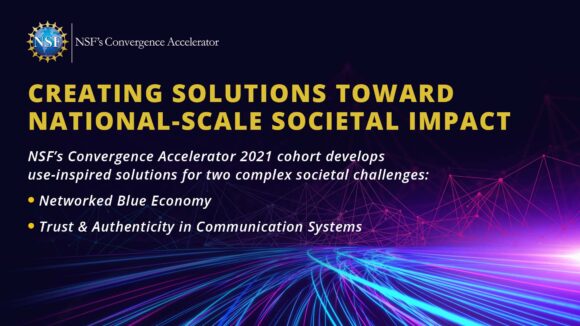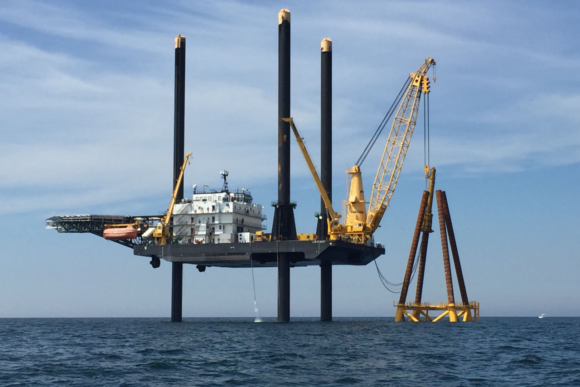 NSF invests $21 million to tackle two complex societal challenges: the networked blue economy, and trust and authenticity in communication systems and will fund 28 teams to fast-track solutions toward with a positive societal impact
NSF invests $21 million to tackle two complex societal challenges: the networked blue economy, and trust and authenticity in communication systems and will fund 28 teams to fast-track solutions toward with a positive societal impact
The National Science Foundation (NSF) has awarded Rutgers a $750,000 Convergence Accelerator grant for the project, “Regional climate change projections to enable equitable ocean planning for the blue economy.” The main focus of the collaborative project is to make projections of climate impacts actionable and useful for the ocean economy in the northeast U.S. Rutgers is the lead institution and collaborating partners include University of Connecticut, University of Massachusetts, The Nature Conservancy, the Responsible Offshore Science Alliance (ROSA), University of Wisconsin,Rutgers Educational Opportunity Fund, the Pacific Northwest College of Art and the National Oceanic and Atmospheric Administration.
Malin Pinsky, associate professor in the Department of Ecology, Evolution and Natural Resources, is leading the project with fellow Rutgers personnel, Kevin St. Martin, associate professor in the Department of Geography; Enrique Curchitser, professor in the Department of Environmental Sciences; Doug Zemeckis, marine extension agent in the Department of Agriculture and Natural Resources; Jacqueline Moore, assistant director in SEBS Educational Opportunity Fund; and Michael Allen, postdoctoral researcher in the Department of Ecology, Evolution, and Natural Resources.

NSF Convergence Construction of the Block Island Wind Farm off Rhode Island, the first offshore wind farm in the United States.
According to Pinsky, ‘there is a large outreach component to co-design useful information tools for businesses, communities, and government agencies, and to engage historically marginalized communities in ocean planning. We’re primarily addressing climate impacts to offshore wind energy, fisheries, and ocean conservation.”
The National Science Foundation Convergence Accelerator program is building upon basic research and discovery to accelerate solutions in two critical research areas: the Networked Blue Economy, and Trust and Authenticity in Communications.
With an investment of $21 million, NSF has selected 28 multidisciplinary teams for phase one of the Convergence Accelerator program 2021 cohort, phase 1.
Each team, comprised of a wide range of disciplines and expertise from academia, industry, government, nonprofit and other communities of practice, will begin in phase 1. Over the next nine months, each team will develop their initial idea into a proof of concept, identify new team members and partners, and participate in the innovation curriculum.
“The Convergence Accelerator’s innovation curriculum consists of human-centered design; user discovery; team science; early-stage prototyping; storytelling; and pitch preparation,” said Douglas Maughan, head of the NSF Convergence Accelerator program. “The curriculum is designed to provide our funded teams the tools to transform their pioneering ideas into a proof of concept, then prototype and finally a solution. Teams will also be required to develop partnerships to support solution sustainability and transition to practice.”
Convergence Accelerator research topics begin as an ideation process – gathering input from the community. Identified topics that meet the program’s criteria are coordinated into community workshops to further develop and incorporate convergence research, and a wide range of stakeholders. The workshop findings assist NSF in selecting the research topics.
“The Networked Blue Economy and Trust and Authenticity in Communication Systems topics were chosen based on community input, research priorities and immediate need to create sustainable solutions,” said Maughan.
The Convergence Accelerator’s Networked Blue Economy (Track E) includes 16 multidisciplinary teams. The overarching track goal is to interconnect the blue economy and accelerate convergence across ocean sectors; creating a smart, integrated, connected and open ecosystem for ocean innovation, exploration and sustainable utilization. Collectively, funded research teams will produce innovative tools, techniques, methods and educational resources, as well as solutions that improve human engagement with oceans as both an environment and resource.
More information about the Convergence Accelerator program can be found at nsf.gov.

